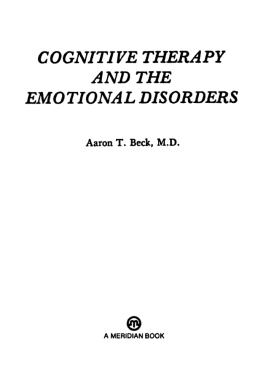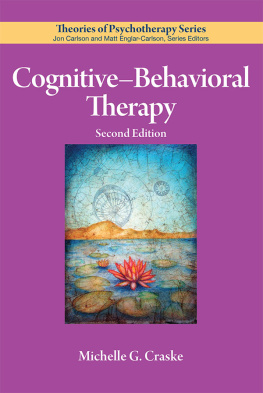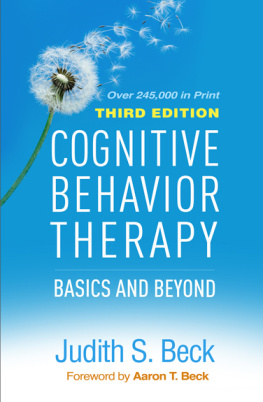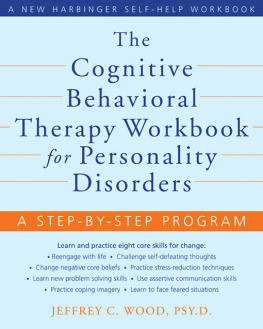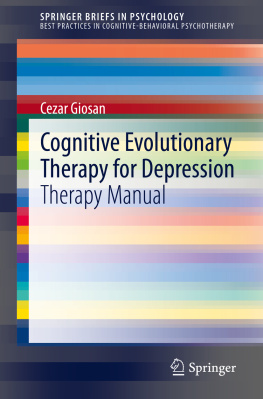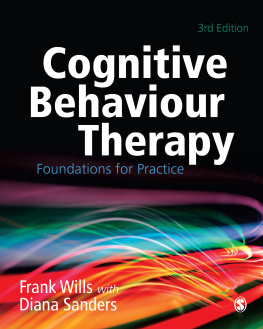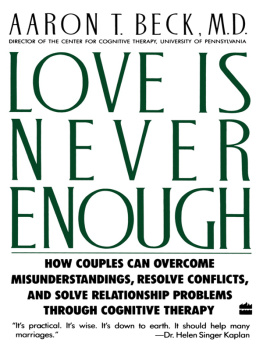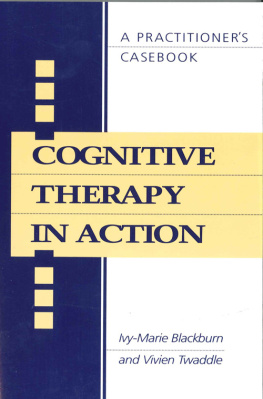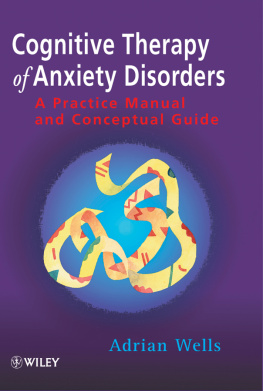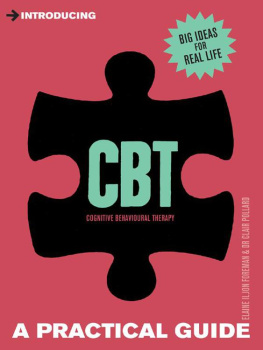Aaron T. Beck - Cognitive Therapy and the Emotional Disorders
Here you can read online Aaron T. Beck - Cognitive Therapy and the Emotional Disorders full text of the book (entire story) in english for free. Download pdf and epub, get meaning, cover and reviews about this ebook. year: 1979, publisher: Plume, genre: Religion. Description of the work, (preface) as well as reviews are available. Best literature library LitArk.com created for fans of good reading and offers a wide selection of genres:
Romance novel
Science fiction
Adventure
Detective
Science
History
Home and family
Prose
Art
Politics
Computer
Non-fiction
Religion
Business
Children
Humor
Choose a favorite category and find really read worthwhile books. Enjoy immersion in the world of imagination, feel the emotions of the characters or learn something new for yourself, make an fascinating discovery.
- Book:Cognitive Therapy and the Emotional Disorders
- Author:
- Publisher:Plume
- Genre:
- Year:1979
- Rating:5 / 5
- Favourites:Add to favourites
- Your mark:
- 100
- 1
- 2
- 3
- 4
- 5
Cognitive Therapy and the Emotional Disorders: summary, description and annotation
We offer to read an annotation, description, summary or preface (depends on what the author of the book "Cognitive Therapy and the Emotional Disorders" wrote himself). If you haven't found the necessary information about the book — write in the comments, we will try to find it.
Cognitive Therapy and the Emotional Disorders — read online for free the complete book (whole text) full work
Below is the text of the book, divided by pages. System saving the place of the last page read, allows you to conveniently read the book "Cognitive Therapy and the Emotional Disorders" online for free, without having to search again every time where you left off. Put a bookmark, and you can go to the page where you finished reading at any time.
Font size:
Interval:
Bookmark:

Aaron T. Beck, M.D.

To Phyllis
and
Alice, Daniel, Judy, and Roy
MERIDIAN
Published by the Penguin Group
Penguin Books USA Inc., 375 Hudson Street, New York, New York 10014, USA
Penguin Books Ltd, 27 Wrights Lane, London W8 5TZ, England
Penguin Books Australia Ltd, Ringwood, Victoria, Australia
Penguin Books Canada Ltd, 10 Alcorn Avenue, Toronto, Ontario, Canada M4V 3B2 Penguin Books (N.Z.) Ltd, 182190 Wairau Road, Auckland 10, New Zealand
Penguin Books Ltd, Registered Offices: Harmondsworth, Middlesex, England
First published by Meridian, an imprint of Dutton Signet, a division of Penguin Books USA Inc. This is an authorized reprint of a hardcover edition published by International Universities Press, Inc.
First Printing, October, 1979
ISBN: 978-1-101-65988-5
Copyright 1976, Aaron T. Beck, M.D.
All rights reserved. For information address International Universities Press, 59 Boston Post Rd., Madison, CT 06443-1524.
 REGISTERED TRADEMARKMARCA REGISTRADA
REGISTERED TRADEMARKMARCA REGISTRADA
Without limiting the rights under copyright reserved above, no part of this publication may be reproduced, stored in or introduced into a retrieval system, or transmitted, in any form, or by any means (electronic, mechanical, photocopying, recording, or otherwise), without the prior written permission of both the copyright owner and the above publisher of this book.
BOOKS ARE AVAILABLE AT QUANTITY DISCOUNTS WHEN USED TO PROMOTE PRODUCTS OR SERVICES. FOR INFORMATION PLEASE WRITE TO PREMIUM MARKETING DIVISION, PENGUIN BOOKS USA INC., 375 HUDSON STREET, NEW YORK, NEW YORK 10014.
In recent years, emotional disorders have attracted an enormous amount of attention and publicity. This intense interest is readily evident in the best-seller list of books sold to the public and in the contents of popular magazines. College courses in abnormal psychology have achieved a spectacular growth in popularity, and the number of psychiatrists, clinical psychologists, and other professionals in the mental health field has escalated. Bountiful outlays of public funds, as well as private contributions, have been poured into an enormous expansion of community mental health centers and other psychiatric facilities.
Paradoxically, the popularization of emotional disorders and the prodigious efforts to mass-produce professional services have occurred in the context of increasingly sharp disagreements among authorities regarding the nature and appropriate treatment of these disorders. With intriguing regularity, new theories and therapies have captured the imagination of both the layman and the professional and have then gradually drifted into oblivion. Moreover, the most durable schools devoted to the study and treatment of emotional disturbancestraditional neuropsychiatry, psychoanalysis, and behavior therapystill retain their original differences in theoretical framework and experimental and clinical approaches.
Despite the striking differences among these dominant schools, they share one basic assumption: The emotionally disturbed person is victimized by concealed forces over which he has no control. Emerging from the nineteenth-century doctrine of physicalism, traditional neuropsychiatry searches for biological causes such as chemical or neurological abnormalities, and applies drugs and other physical measures to relieve the emotional disorder. Psychoanalysis, whose philosophical underpinnings also were formed in the nineteenth century, attributes an individuals neurosis to unconscious psychological factors: The unconscious elements are sealed off by psychological barriers that can only be penetrated by psychoanalytic interpretations. Behavior therapy, whose philosophical roots can be traced to the eighteenth century, regards the emotional disturbance in terms of involuntary reflexes based on accidental conditionings that occurred previously in the patients life. Since, according to behavioral theory, the patient cannot modify these conditioned reflexes simply by knowing about them and trying to will them away, he requires the application of counterconditioning by a competent behavior therapist.
Because these three leading schools maintain that the source of the patients disturbance lies beyond his awareness, they gloss over his conscious conceptions, his specific thoughts and fantasies.
Suppose, however, that these schools are on the wrong track. Let us conjecture, for the moment, that a persons consciousness contains elements that are responsible for the emotional upsets and blurred thinking that lead him to seek help. Moreover, let us suppose that the patient has at his disposal various rational techniques he can use, with proper instruction, to deal with these disturbing elements in his consciousness. If these suppositions are correct, then emotional disorders may be approached from an entirely different route: Man has the key to understanding and solving his psychological disturbance within the scope of his own awareness. He can correct the misconceptions producing his emotional disturbance with the same problem-solving apparatus that he has been accustomed to using at various stages in his development.
These assumptions converge on a relatively new approach to emotional disorders. Nevertheless, the philosophical underpinnings of this approach go back thousands of years, certainly to the time of the Stoics, who considered mans conceptions (or misconceptions) of events rather than the events themselves as the key to his emotional upsets. This new approachcognitive therapysuggests that the individuals problems are derived largely from certain distortions of reality based on erroneous premises and assumptions. These incorrect conceptions originated in defective learning during the persons cognitive development. Regardless of their origin, it is relatively simple to state the formula for treatment: The therapist helps a patient to unravel his distortions in thinking and to learn alternative, more realistic ways to formulate his experiences.
The cognitive approach brings the understanding and treatment of the emotional disorders closer to a patients everyday experiences. The patient can regard his disturbance as related to the kinds of misunderstandings he has experienced numerous times during his life. Moreover, he has undoubtedly had previous successes in correcting misinterpretations, either through acquiring more adequate information or by recognizing the logical fallacy of his misunderstandings. The cognitive approach makes sense to a patient because it is somehow related to his previous learning experiences and can stimulate confidence in his capacity to learn how to deal effectively with present misconceptions that are producing painful symptoms. Furthermore, by bringing emotional disorders within the purview of everyday experience and applying familiar problem-solving techniques, the therapist can immediately form a bridge to the patient.
Of course, a question can be raised as to the validity of cognitive psychology and cognitive therapy. Fortunately, since the cognitive phenomena are readily observable by the patient through introspection, their nature and relationships can be tested in a wide variety of systematic experimentsunlike the more abstract constructs postulated by psychoanalysis. A growing number of systematic studies have given continuous support to the foundations of cognitive psychology, and therapeutic trials have demonstrated the efficacy of cognitive therapy.
Font size:
Interval:
Bookmark:
Similar books «Cognitive Therapy and the Emotional Disorders»
Look at similar books to Cognitive Therapy and the Emotional Disorders. We have selected literature similar in name and meaning in the hope of providing readers with more options to find new, interesting, not yet read works.
Discussion, reviews of the book Cognitive Therapy and the Emotional Disorders and just readers' own opinions. Leave your comments, write what you think about the work, its meaning or the main characters. Specify what exactly you liked and what you didn't like, and why you think so.

